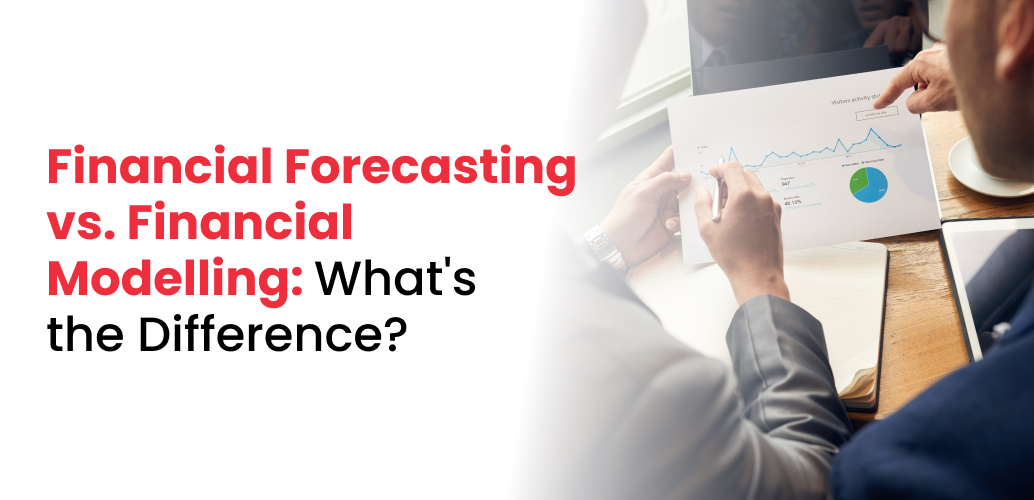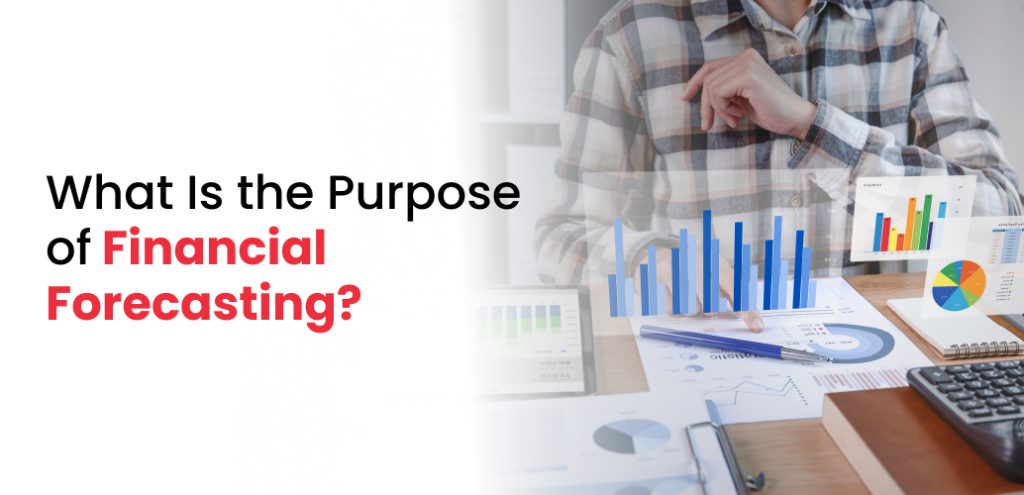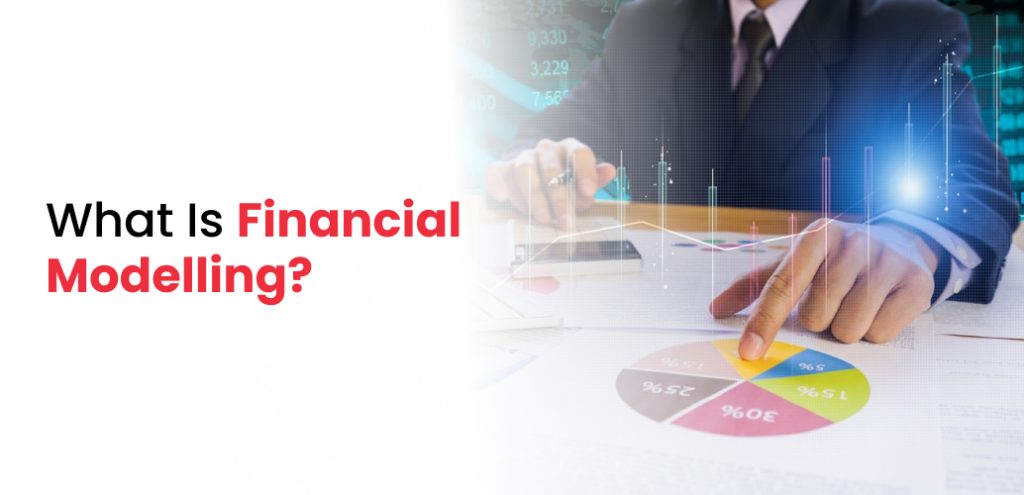Blog > Financial Forecasting vs. Financial Modelling: What’s the Difference?
Financial Forecasting vs. Financial Modelling: What’s the Difference?
December 5th, 2023

A profound knowledge of finance is the key to various opportunities propelling your career to new heights. Most firms seek professionals to act effectively by providing significant guidance and an in-depth market understanding.
Discerning the differences between financial forecasting and financial modelling is crucial in effectively functioning your work. In this blog, we will comprehend the basics of financial forecasting and financial modelling and the essential factors that will help you navigate the difference between the two.
Let’s explore the primary purposes that financial forecasting serves in the realm of the digital world.
The process of constructing an equation or simulation of a financial situation or a firm, generally using spreadsheets or specialised software, is known as financial modelling. It entails the creation of a thorough model that forecasts a company's financial performance based on historical data, future assumptions, and other financial modelling approaches.
Also Read : Excel at Financial Modelling and Analysis with Our Step-by-Step Guide
Also Read : Financial Modelling and Analysis Course | Here’s Everything You Need to Know
Acknowledging their objectives and approaches enables businesses to precisely manage uncertainty and develop well-informed financial plans for long-term success. A financial modelling certification aids you in boosting your professional journey and making it more impactful while providing all expertise and skills.
Embrace the power of your strategic foresight and accuracy. Contact upGrad Campus and explore financial modelling courses with placement opportunities for fulfilling a career in finance.
Youtube Video : https://www.youtube.com/watch?v=PzYePbPuT8Y
Discerning the differences between financial forecasting and financial modelling is crucial in effectively functioning your work. In this blog, we will comprehend the basics of financial forecasting and financial modelling and the essential factors that will help you navigate the difference between the two.
What is Financial Forecasting?
Financial forecasting refers to predicting a business’s financial future based on past performance data such as revenue, cash flow, expenses, or sales. The various unanticipated elements that can influence corporate success require assumption and judgement.What Is the Purpose of Financial Forecasting?

Let’s explore the primary purposes that financial forecasting serves in the realm of the digital world.
1. Anticipating Future Trends
Financial forecasting assists firms in anticipating and understanding trends in their financial performance, allowing them to plan for prospective challenges and opportunities.2. Resource Planning
With financial forecasting, businesses can plan and allocate resources better. This includes human resources, capital investments, and other operational requirements.3. Budgeting and Goal Setting
Financial forecasting is the foundation for budgeting, assisting firms in setting realistic financial objectives and allocating resources appropriately.4. Risk Management
Understanding financial forecasting helps you to identify potential financial risks and uncertainties and allows businesses to design risk mitigation strategies. It improves your capacity to manage unpredictable financial conditions.5. Investor Communication
Businesses often use financial forecasting to communicate their financial outlook to investors, stakeholders, and creditors, creating transparency and trust.What Are the Key Financial Forecasting Components?
Let's uncover the critical components of financial forecasting.1. Revenue Forecasting
Analysing seasonality and economic variables that impact sales is integral to revenue forecasting. This process incorporates historical data, market analysis, and sales projections to anticipate sales and income trends.2. Expense Forecasting
Financial forecasting allows you to estimate future expenditures and expenses linked with operations, production, marketing, and administrative services. Expense forecasting includes variable and constant expenditures and any projected adjustments.3. Cash Flow Prediction
Financial forecasting allows for anticipated financial inflows and outflows. This strategy is critical in ensuring the corporation has sufficient finances to satisfy its regular responsibilities.4. Profitability Prediction
Financial forecasting analyses the relationship between revenue and expenses to forecast the company's profitability. This includes calculating gross profit, operational profit, and net profit margins.What Is Financial Modelling?

The process of constructing an equation or simulation of a financial situation or a firm, generally using spreadsheets or specialised software, is known as financial modelling. It entails the creation of a thorough model that forecasts a company's financial performance based on historical data, future assumptions, and other financial modelling approaches.
Also Read : Excel at Financial Modelling and Analysis with Our Step-by-Step Guide
What Is the Purpose of Financial Modelling?
By obtaining a financial modelling online course, you will comprehend the below-mentioned primary purposes of financial modelling.1. Forecasting and Planning
Financial modelling assists firms in forecasting future financial performance, allowing them to plan for growth, expansion, and resource allocation.2. Valuation
In the financial modelling course, you will learn how to assess a company's intrinsic value with expertise. Valuation, a critical concept in business, serves a purpose in mergers and acquisitions, investment analysis, and financial reporting.3. Capital Budgeting
By examining the possible profits and risks connected with capital expenditures, financial modelling helps assess investment opportunities.4. Scenario Analysis
Financial modelling allows you to analyse multiple scenarios and their effects on financial results. It assists firms in making better decisions under various circumstances.5. Risk Management
Risk Management is all about identifying and controlling financial risks by including risk variables and uncertainties in the Financial model. Taking up a financial modelling course would help you understand this critical concept best.What Are the Elements of Financial Modelling?
In a financial modelling course, you will learn about the five major components.1. Income Forecasts
You will learn to forecast income based on past performance, market research, and sales projections. It includes aspects such as pricing adjustments, market share, and seasonality.2. Expense Predictions
Financial modelling provides thorough budgets for marketing, operations, and administrative costs, considering fixed and variable costs and possible ways to cut expenditures.3. Cash Statement Flow
The financial modelling course will allow you to estimate revenue inflows and outflows to determine finance and liquidity needs. It includes elements like capital expenditures and changes in working capital.4. Capital Organisation
By obtaining a financial modelling course, you will be able to analyse the debt and equity makeup of the business. Assessing the effect of the cost of capital on profitability.5. Assumptions
The financial modelling course enables you to articulate and record with clarity any assumptions made regarding the state of the economy, market trends, and company-specific issues. Assumptions could be established about interest rates, inflation, tax rates, and other essential variables.Also Read : Financial Modelling and Analysis Course | Here’s Everything You Need to Know
Navigating Effective Business Strategies: Uncovering Financial Forecasting and Financial Modeling
By obtaining a financial modelling online course, you will dive into complex simulations for valuation, risk analysis, and decision-making. Further financial forecasting estimates future financial patterns and supports strategic planning.Acknowledging their objectives and approaches enables businesses to precisely manage uncertainty and develop well-informed financial plans for long-term success. A financial modelling certification aids you in boosting your professional journey and making it more impactful while providing all expertise and skills.
Embrace the power of your strategic foresight and accuracy. Contact upGrad Campus and explore financial modelling courses with placement opportunities for fulfilling a career in finance.
Youtube Video : https://www.youtube.com/watch?v=PzYePbPuT8Y






Add a Comment